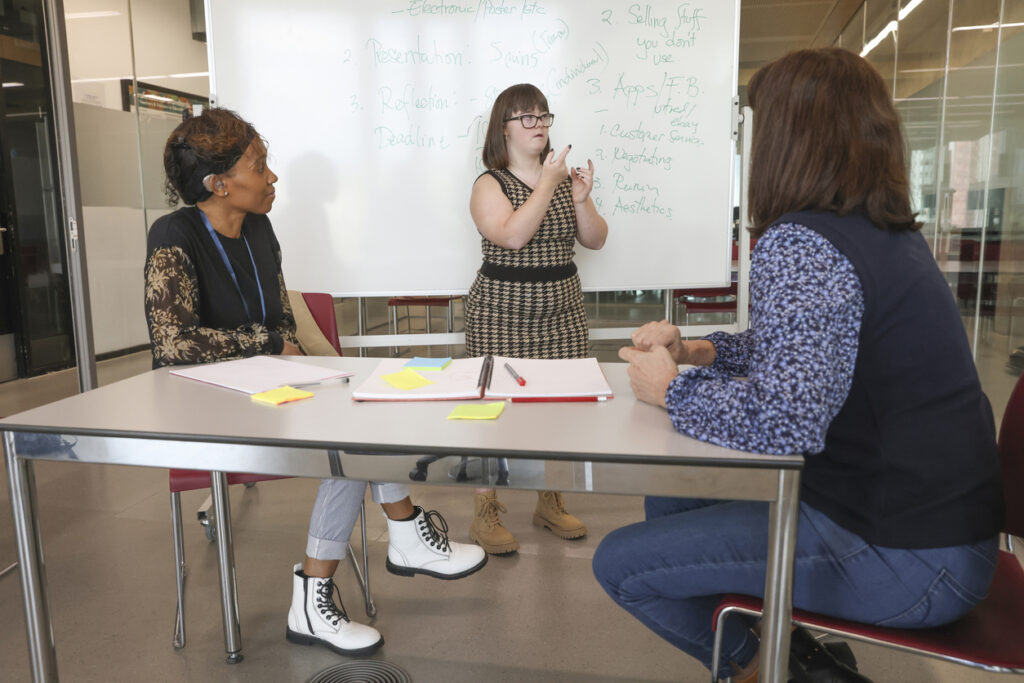Parents’ Guide: Supporting Your Teenager with I/DD in the Transition from High School to Adulthood
April 15, 2025

Transitioning from high school to adulthood can feel daunting, but with early planning and the right resources, students with I/DD and their families can build a foundation for long-term success. This guide outlines key steps for parents to support their students, from transition planning to life skills development, plus Denver-area programs offering mentorship and job training.
Navigating the transition from high school to adulthood can feel overwhelming for parents of teenagers with intellectual and developmental disabilities (I/DD). The shift away from the structured support of an Individualized Education Plan (IEP) raises important questions about the next steps in education, employment, daily care, and independent living.
However, with thoughtful planning and access to the right resources, parents can help their child build a meaningful future. This guide provides actionable steps for a successful transition from high school to adulthood, along with a resource list of Denver-area supports for students with I/DD preparing for the next phase of life.
Steps to Help Your Child Transition Successfully
1. Start Planning Early with Your Child and Their IEP Team
Planning for life after high school should begin early—ideally by age 14—so that students and their families have sufficient time to explore transition services that align with their goals.
Transition planning is a structured process that helps students with IEPs prepare for life after high school, including higher education, employment, and independent living. This student-centered approach focuses on the student’s strengths, interests, and needs. School staff, family, and the student collaborate to create a plan that helps to ensure a smooth transition from school to adulthood.
Below are key steps to consider both before and during this transition planning meeting.
- Work with your child to create a vision for their future. Discuss their interests, strengths, and aspirations to ensure their IEP goals align with their long-term plans. Carving out space for your child to share their goals and identify areas of growth with you is a great exercise to do each year before you attend the IEP renewal meeting.
- Questions to ask your child:
- What do you enjoy doing in your free time?
- What activities or jobs sound interesting to you?
- Do you like working with people?
- Do you prefer spending time indoors or outdoors?
- What skills do you feel like you’ve mastered so far? What are skills you still want to work on?
- Prepare to engage with your child’s IEP team. Transition planning with your child’s IEP team should cover employment, education, and independent living skills. Be sure to ask about:
- Career exploration and job training programs in your area
- Local community-based learning opportunities
- Independent living skills, such as transportation and relationship-building
- Understand available options and avenues. Depending on your child’s goals, there are a variety of pathways to consider. Be sure to ask about available options such as:
- Extended transition services which may be provided by the school district for young adults with disabilities aged 18-21 to gain career, life, and social skills.
- Higher education support programs (such as inclusive college programs)
- Trade schools or vocational training
- Community organizations that provide skills training
- Day programs
2. Plan for Long-Term Support Needs
As your child approaches adulthood, it’s important to consider the legal and financial structures that help ensure their long-term well-being. Planning ahead can provide stability, preserve their rights, and ensure access to essential services without disrupting benefits. From decision-making support to financial planning and eligibility for adult services, these considerations for long-term support will help set the stage for a secure future. Below are a few things to consider.
- Ensure your child’s I/DD determination is in place. This is often required for accessing post-school services, including case management and Medicaid waivers.
- Guardianship and supported decision-making- Guardianship grants a designated individual the legal authority to make decisions for a person with a disability, while supported decision-making allows the individual to retain their rights while receiving guidance from trusted supporters.Parents seeking guardianship for their adult child with a disability must file a petition with probate court after the child turns 18. Through probate court, they provide necessary documentation and attend a court hearing to determine incapacity and the need for guardianship.
- Power of attorney options- Appointing a power of attorney allows a trusted person to make financial or medical decisions on behalf of your child if you are no longer able to. If your child understands and consents to this arrangement, it’s an alternative to guardianship.
- Special needs trusts and Able Accounts – Special needs trusts and Able Accounts are specialized accounts for individuals with disabilities that allow them to save money without losing eligibility for needs-based public benefits like Supplemental Security Income or Medicaid. These accounts can pay for medical care, home modifications, insurance, transportation, and other needs for years to come.
- Eligibility for adult services, such as Medicaid waivers- Medicaid waivers provide funding for long-term support services for adults with disabilities. Rocky Mountain Human Services (RMHS) is the Case Management Agency for both Denver and Adams Counties, meaning it offers case management supports through a person-centered approach to individuals with disabilities.
3. Build a Network of Resources
A reliable support system is crucial as your teenager gains independence and moves toward their desired post-school future. In addition to identifying mentors and social connections within your personal network, consider connecting with local organizations that offer support and programming for young adults with I/DD. Here are a few suggestions:
- Connect with community organizations that specialize in I/DD support to expand your network such as your local branch of the Arc or The American Association of People with Disabilities.
- Explore ongoing adult services, including:
- Case management for long-term planning
- Employment support programs
- Social and recreational programs for adults with I/DD
4. Encourage Independence and Life Skills Development
Building self-sufficiency takes time and practice, but every small step adds up to greater independence. By encouraging your child to develop daily living skills like managing personal care, handling money, learning how to take public transportation, and preparing meals, you help them to build confidence in navigating everyday life.
Additionally, the transition between adolescence and adulthood is a perfect time for your teenager to get more involved in their community while actively exploring their interests and building connections outside school and your household. Whether through volunteering, internships, or part-time jobs, work experience fosters a sense of purpose, self-determination, and social skills.
In addition, helping your teenager find social groups, hobby clubs, and structured activities is important to fostering friendships and independence. By strengthening these skills and experiences, your child will gain the tools they need to take on more responsibilities and make decisions that support their growing independence.
5. Familiarize Yourself with Resources in Denver Metro
If you live in the Denver area, there are many resources that provide teenagers and young adults with I/DD the opportunity to build life skills, gain work experience, foster community, and plan for their future.
Resources that Provide Mentorship, Real-World Training, and Life-Skills Development
- Transition Program of Denver Public Schools – This program helps young adults with disabilities ages 18–21 develop independent living, employment, and self-advocacy skills through real-world experiences, job training, and community-based learning.
- Teaching the Autism Community the Trades (TACT)– TACT provides hands-on training in skilled trades such as carpentry, mechanics, and welding, helping individuals with autism build skills and gain meaningful work experience.
- Access Gallery– A creative nonprofit that offers young people with disabilities opportunities to develop job skills and independence through art, entrepreneurship, and paid internships in the arts industry.
- Ready to Achieve Mentoring Program (RAMP) Colorado: RAMP is a career-focused mentoring program for youth with disabilities, offering structured guidance on job readiness, life skills, and goal setting.
- Revel– Revel supports young adults with I/DD by providing a community-focused space where they can build life skills, gain independence, and explore their interests. Through social engagement, hands-on learning, and mentorship, Revel helps participants develop confidence and prepare for meaningful employment and independent living.
- Easter Seals Colorado – This organization provides a range of programs that support young adults with disabilities in building independence, including employment services, life skills training, and transition programs to help them navigate adulthood.
- Bayaud Enterprises – One aspect of this organization’s work is to offer job training, employment placement, and benefits planning for individuals with disabilities, supporting their journey toward financial independence and self-sufficiency.
- Colorado’s Division of Vocational Rehabilitation – A state agency that assists people with disabilities in preparing for, finding, and maintaining employment through career counseling, job coaching, and financial support for workplace accommodations.
Resources for Long-Term Planning, Benefits Navigation, and General Support
- Benefits in Action: Provides guidance on navigating public benefits, including Medicaid, Social Security, and SNAP, helping individuals with disabilities access the resources they need for greater financial stability and independence.
- The Arc of Colorado: Advocates for the rights of individuals with intellectual and developmental disabilities, providing resources, support, and guidance to help them and their families navigate education, employment, and independent living.
- AdvocacyDenver: Specializes in protecting the rights of people with disabilities, offering individualized advocacy, benefits assistance, and support in accessing education, housing, and employment opportunities.
- Guardianship Alliance of Colorado: This organization provides education, resources, and support for families navigating guardianship and alternatives like supported decision-making. They offer training on legal options, rights, and responsibilities, helping young people with disabilities and their families make informed choices about their future independence.
How RMHS Supports Students in Denver Public Schools (DPS)
Rocky Mountain Human Services (RMHS) partners with Denver Public Schools to ensure students with I/DD have access to vital resources after they exit the school system. RMHS School & Community Liaisons provide specialized support in several ways including:
- Connecting families with case management services for ongoing support
- Sharing information about financial assistance programs, including the Denver Mill Levy Program, which provides flexible supports to Denver residents with I/DD
- Recommending community organizations that offer multilingual support for families navigating services such as El Grupo Vida and Project Worthmore.
Final Tips for Parents and Next Steps
Navigating the transition to adulthood can feel overwhelming, but with the right approach and support, you can help set your child up for success. Being proactive, encouraging your teenager’s growth and increased independence, and tapping into available resources can make all the difference
- Attend IEP and transition planning meetings with a proactive mindset—ask questions and request information about available resources.
- Encourage your child to explore their interests and aspirations so they can build a fulfilling future.
- Remember that you are not alone—organizations like RMHS are here to provide guidance, resources, and reassurance as your child navigates this important transition.
If you live in Denver or Adams County and need guidance in planning your child’s transition from school to adulthood,RMHS is here to help. Our team can connect you with the right services, resources, and supports to make this transition smoother for both you and your child as you navigate the journey into adulthood. Visit our website to learn more.







